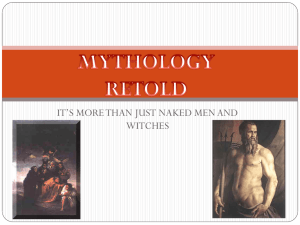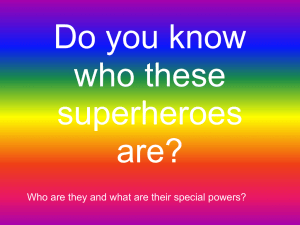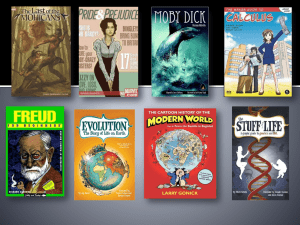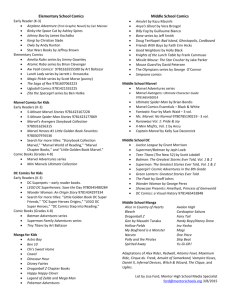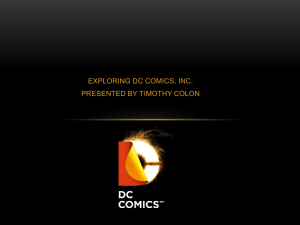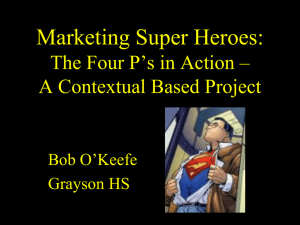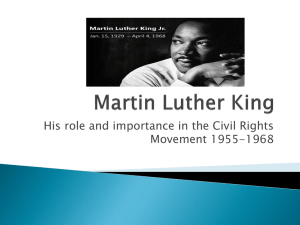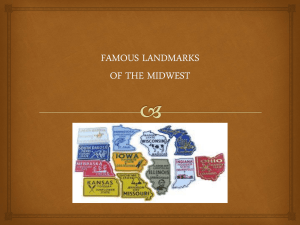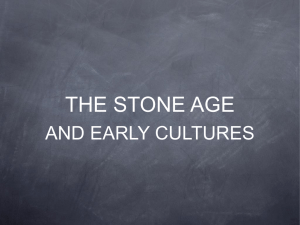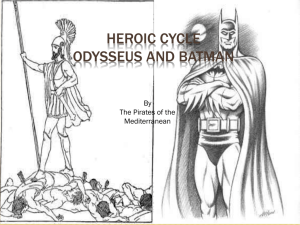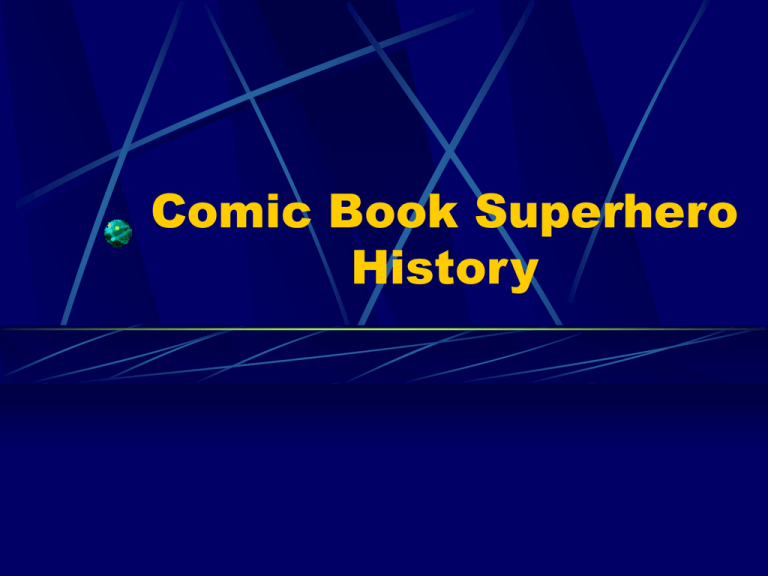
Comic Book Superhero
History
Early Precursor to
Superheroes
The Scarlet Pimpernel
a play and adventure novel by Baroness
Emmuska Orczy, written in 1903
Story: a British nobleman adventurer
known only as The Scarlet Pimpernel,
after the small flower with which he signs
his secret notes, leads a secret society
which rescues French noblemen from the
guillotine during the French Revolution.
Turns out he’s the clownish Sir Percy
Blakeney, who pretends to be a drunken
fop to hide his adventurous identity. His
wife is, Lois Lane-style, anamoured of the
adventurer, not knowing he is actually her
husband, for whom she has little respect.
Notable actors: Anthony Andrews,
Richard E. Grant
A Precursor To
Superheroes
Zorro
Created by New York-based pulp writer Johnston
McCulley in 1919.
Appeared in novels, short stories and films before
appearing in comics
Secret identity: Don Diego de la Vega, a Spanish
nobleman troubled by Spain’s colonial rule of California,
adopts the identity of masked trickster anarchist vigilante
Zorro (Spanish for “fox”). Boring rich man by day,
masked terrorist at night. His horse was called Toronado.
His sidekick was deaf-mute servant Bernardo (a
precursor to Bruce Wayne’s Alfred). He rode out of a
secret cave under his mansion as well.
The novel was helped by stuntman-actor Douglas
Fairbanks and Canadian-born wife Mary Pickford making
a movie adaptation a year later for their new studio
United Artists, which they started with Charlie Chaplin.
Actors: Douglas Fairbanks, Guy Williams (for Disney) and
Antonio Banderas (first Hispanic actor ever to play Zorro)
Another Precursor To
Superheroes
The Phantom
created by Lee Falk, (also creator of comics
character Mandrake the Magician)
Was a daily newspaper comic starting in
1936
Story: Kit Walker is the 21st in a line of
legendary “Phantoms,” each called “The
Ghost Who Walks,” having no supernatural
abilities, but being so ninja-like as to appear
to have ghost powers. On his left hand is a
ring with crossed sabres, which he gives to
people he will protect. On his right, a ring
with a skull, made from the nails in Jesus’
cross, which leaves a skull-shaped mark on
enemies’ faces when he punches them.
Rides a horse named Hero. Leads a huge
army of Africans called the Jungle Patrol.
Actor who played him in 1996 movie: Billy
Zane
Mystery Men:
Big Influences On
Superheroes
Will Eisner’s The Spirit
Appeared in newspapers right when
Superman and Batman were taking
off, starting in 1940
Denny Colt is a masked vigilante
who solves mystery and stops
criminals in a huge city, with the
blessing of the police commissioner.
Had a lair under his own tombstone,
being thought dead.
Other characters: black sidekick
Ebony White, villains The Octopus,
Dr. Cobra and Mister Carrion; a
witch named (witch) Hazel P.
Macbeth, femme fatales P'Gell,
Sand Saref, Silk Satin, Silken Floss
and Lorlei Rox.
Actors: Gabriel Macht (with Samuel
Jackson as The Octopus) in 2008
Another Mystery Man
The Shadow
Created by Walter B. Gibson as a radio drama, then
series of short stories for magazines, then a comic
First aired on Detective Story Hour on radio in 1931
Story: rich guy Lamont Cranston learns the ancient
Eastern art of “clouding men’s minds” when he is
near, making them unable to see him. By night he
drives around fighting crime with his two pistols and
maniacal laugh. A precursor to Batman and the
Joker
Catchphrases: "Who knows what evil lurks in the
hearts of men? The Shadow knows!" (maniacal
laugh) and “Crime does not pay!”
Had the attributes and stylized look of a criminal or
robber, but was a (dark) hero. Had a Jewish
chauffeur and a black sidekick.
Crime often took place in Chinatown with Asian
villains
Girlfriend: Margo Lane
Actors: Frank Readick, Jr., Orson Wells, Alec
Baldwin
Yet Another Mystery
Man
The Green Hornet
created by George W. Trendle and Fran
Striker for radio in 1936, and then adapted for
comics and short stories, film serials and
television
Story: Britt Reid is a wealthy newspaper
publisher who goes out with his Asian sidekick
Kato to fight crime in his car Black Beauty with
various gadgets, including a sleep gun.
Concurrent with the Adam West Batman and
aired on the same channel, The Green Hornet
TV show aired in 1966, starring an Asian actor
named Bruce Lee(!) as Kato. Fans were more
into Bruce Lee than the Green Hornet.
Notable actors: Van Williams, Seth Rogan
The Golden Age: 1930s1950s
First comic book
superhero?
D.C. Comic’s Superman
Appeared in Action Comics in 1938
Created by American writer Jerry Siegel and
Canadian-born American artist Joe Shuster in
1932
Secret identity: Clark Kent (named after actors
Clark Gable and Kent Taylor). Reporter at The
Daily Planet newspaper in Metropolis. Lair: the
Fortress of Solitude
Born Kal-El on doomed planet Krypton to parents
Jor-El and Lara. Weakness: kryptonite (shards of
his exploded birth planet)
At first, only able “to leap tall buildings in a single
bound,” his powers kept getting increased until he
could fly in space.
Superman characters: Lana Lang, Lex Luthor,
Lois Lane, Jimmy Olsen, Perry White (boss)
Superman actors: George Reeves, Christopher
Reeve, Dean Cain, Tom Welling, Brandon Routh
A dark opposite to
Superman?
D.C. Comic’s Batman
First appeared in Detective Comics in May
1939
created by artist Bob Kane and writer Bill
Finger, based on a The Shadow story.
Secret identity: millionaire Bruce Wayne.
Lair: the Batcave under Wayne Manor in
Gotham City.
Parents Thomas and Martha Wayne were
shot in front of him as a small boy.
Other characters Alfred Pennyworth the
butler, Dick Grayson (Robin), Police
Commissioner Gordon
Huge assortment of gadgets, huge “rogue’s
gallery” of whacky, themed supervillains
including The Joker, The Penguin, Poison
Ivy, Mr. Freeze, Bane, Killer Croc
Batman actors: Adam West, Michael Keaton,
Val Kilmer, George Clooney, Christian Bale
Female Superhero?
D.C. Comics’ Wonder Woman
Created by William Moulton Marston (the
psychologist who invented the lie
detector before inventing the character
with the lasso which made criminals tell
the truth) and H. G. Peter
First appeared in All Star Comics in 1941
Secret identity: Diana Prince (sometime
army intelligence officer)
From Themyscira, an all-female island of
Amazons, created from clay by mother
Hippolyta (queen of the Amazons,
making Diana a princess)
Originally fought nazis with boyfriend
Steve Trevor. Before they decided she
could fly, they gave her an invisible jet.
Weakness: helpless if tied up by a man.
Wonder Woman actresses: Lynda Carter
(70s), Adrianne Palicki (2011)
Magical Superman
Ripoff?
Captain “The Big Red Cheese” Marvel
(never owned by Marvel Comics) Owned
by Fawcett Comics’ (then bought by D.C.
Comics)
Created in 1939 by artist C. C. Beck and
writer Bill Parker
First appears in Whiz Comics in 1940
12 year old homeless newsboy Billy
Batson calls out the name of the wizard
Shazam and magically transforms into an
adult superhero called Captain Marvel
Lacks Superman’s vision powers, but
has “Wisdom of Solomon”
Other characters: Mary Marvel, Captain
Marvel Junior, Uncle Marvel
Villains: Black Adam, Dr. Sivana
American WWII
Supersoldier?
Marvel Comics’ Captain America
created by Joe Simon and Jack Kirby.
first appeared in Captain America
Comics #1 (March 1941) by Timely
Comics, who would kinda become
Marvel Comics later
Secret identity: weakling Steve Rogers
is given an experimental Supersoldier
Formula and an indestructible shield
(adamantium and vibranium). Likes to
ride a motorcycle.
This actor’s dad wrote
The Catcher In The Rye (!)
Frozen in ice at end of WWII so they
could bring him back in comics later
Member (leader) of Marvel’s The
Avengers
Sidekick: Bucky Barnes
Villains: Nazis, Hitler, The Red Skull,
Baron Zemo
(notable) Captain America actors: Chris
Evans
“Runs fast” guy?
D.C. Comics’ The Flash
Created by writer Gardner Fox
and artist Harry Lampert
first appeared in Flash Comics
#1 (January 1940)
Secret identity: Jay Garrick, who
fell asleep in a science lab and
inhaled heavy water vapour.
Wore red football shirt and his
father’s WWI helmet, with wings
on it, like Greek god Mercury
Part of one of the earliest
superhero teams, The Justice
Society (later “League”) of
America
Ring Dude
D.C. Comics’ Green Lantern
was created by writer Bill Finger and
artist Martin Nodell (who was ripping off
Aladdin)
First appeared in All-American Comics
#16 (July 1940)
Secret identity: railroad engineer Alan
Scott
Story: inherited a green lantern made
from the metal in a meteor which fell to
earth, and told him how to make a
magic ring which could do almost
anything.
(make him invisible, walk through walls,
paralyse or blind people temporarily, cut
stuff like a welding torch)
Weakness: the ring doesn’t work on
anything made of wood. Scott learned
this when hit with a wooden club.
Part of the Justice Society of America
...and I shall shed my
light over dark evil.
For the dark things
cannot stand the light,
The light of the Green
Lantern!
The Silver Age: mid 50s1970
A New(s) Flash
Secret identity: Barry Allen, police
scientist (from talkshow hosts Steve
Allen and Barry Gray
created by writers Robert Kanigher
and John Broome and penciler
Carmine Infantino
First appeared in Showcase #4 (Oct.
1956)
Story: a lightning bolt hits chemicals
in his lab, drenching him in them.
Other characters: girlfriend Iris West,
Wally West (Kid Flash)
Villains: Mirror Master, Captain Cold,
Weather Wizard, Pied Piper, The
Trickster, Captain Boomerang
Actor Michael Rosenbaun is
remarkable for playing Lex Luthor on
Smallville while voicing the animated
Flash on Justice League.
New Green Lantern
Secret identity: fearless test pilot Hal Jordan
Revamped by writer John Broome and
Batman artist Gil Kane,
First appearence in Showcase #22 in 1959
Story: on the planet Oa, little blue creatures
called the Guardians of the Universe dole out
power rings to space police called the Green
Lantern Corps. Abin Sur is ours, and when
he dies, the ring finds Jordan. It can form
solid objects out of imagination/will
Weakness: doesn’t work on anything yellow
Other characters: girlfriend Carol Ferris, Inuit
best friend Tom “Pieface” Kalmaku
Villains: Sinestro, Parallax (evil Hal Jordan)
Played in the 2010 movie by Canadian actor
Ryan Renolds (who was in X-Men Origins:
Wolverine as Deadpool)
Guardians on Oa were based on Israel’s
Prime Minister David Ben Gurion
In brightest day, in
blackest night,
No evil shall escape my
sight
Let those who worship
evil's might,
Beware my power... Green
Lantern's light!
Marvel’s teen hero
(The Amazing) Spider-Man
created by writer-editor Stan Lee and writerartist Steve Ditko (who just drew himself for
Peter Parker)
first appeared in Amazing Fantasy #15
(August 1962)
Secret identity: Peter Parker
High school science nerd is bitten by a
radioactive spider and gains its powers.
Works at Daily Bugle, not Daily Planet.
Photographer, not reporter. Hyphen in
name.
Other characters: Aunt May, J.Jonah
Jameson (boss), Mary Jane Watson, Gwen
Stacy, Flash Thompson, Harry Osbourne
Villains: The Green Goblin, Doctor Octopus,
The Lizard, Electro, The Kingpin, Mysterio,
The Rhino, Kraven the Hunter.
(notable) actors: Tobey McGuire, Andrew
Garfield
Marvel’s Monster
(The Incredible) Hulk
Created by Stan Lee and Jack Kirby (who made Captain
America)
First appeared in The Incredible Hulk #1 (May 1962)
Secret identity: scientist Bruce Banner (sometimes
David)
Based on Robert Louis Stephenson’s Doctor Jekyll and
Mr. Hyde and Mary Shelley’s Frankenstein.
Story: a gamma radiation accident makes Banner
uncontrollably transform whenever he loses his temper.
Originally grey, but a printing error made him green,
which they liked.
Other characters: Rick Jones, girlfriend Betsy Ross,
General “Thunderbolt” Ross, cousin Jennifer “She Hulk”
Walters, Dr. Leonard “Doc” Sampson
Villains: Abomination, The Leader
Notable actors Lou Ferrigno/Bill Bixby, Eric Bana, Ed
Norton, Mark Rufalo
Marvel’s Blind Character
Daredevil: The Man Without Fear
created by writer-editor Stan Lee
and artist Bill Everett (help from
Jack Kirby)
first appeared in Daredevil #1 (April
1964)
Secret identity: Matt Murdock
Story: blind(ed by radiation) New
York street kid becomes a lawyer,
while fighting crime like
Batman/Spider-man using his other,
greatly enhanced senses
Other characters: Jack Murdock,
Foggy Nelson, Karen Page
Villains: The Kingpin, The Fixer,
Bullseye, Electra
Notable actors: Ben Affleck
Marvel’s Tech Hero
(The Invincible) Iron Man
created by writer-editor Stan Lee,
developed by scripter Larry Lieber, and
designed by artists Don Heck and Jack
Kirby
first appeared in Tales of Suspense #39
(March 1963)
(not) secret identity: millionaire Tony Stark
(flying Batman with armour and energy
weapons)
Story: Howard Hughes-style millionaire
inventor turns a pacemaker needed to
keep his damaged heart going into a flying
suit of armour. A cold war, anti-communist,
anti-asian one.
Other characters: Jarvis (Batman-style
butler), assistant Penny Potts, chauffeur
Happy Hogan, Rhodey Rhodes
Villains: alcohol, the Mandarin, Justin
Hammer, Crimson Dynamo, Backlash
Notable actors: Robert Downey Jr.
Marvel’s First Superhero
Team
The Fantastic Four
First appeared in The Fantastic Four #1 (Nov.
1961)
created by writer-editor Stan Lee and artist
and co-plotter Jack Kirby
Story: scientist Reed Richards, with girlfriend
Sue Storm, her brother Johnny and pilot Ben
Grimm, fly an experimental spacecraft and get
exposed to space radiation, giving them
powers. No secret identities.
They become: Mr. Fantastic, The Human
Torch (II), The Thing and Invisible Girl/Woman
Villains: Galactus (eater of worlds), Dr. Doom,
the Skrull Empire
Actors: Ioan Gruffudd, Chris “Captain
America” Evans, Michael Chiklis, Jessica Alba
Marvel’s Mutant Team
The (Uncanny) X-Men
first appeared in The X-Men #1 (September 1963)
created by writer Stan Lee and artist Jack Kirby
Story: a mutant professor starts a school to train
mutant children to be superheroes. The ideological
difference between Martin Luther King
(understanding) and Malcolm X (equality through
violence if necessary) inspired the Professor
X/Magneto divide. About tolerance.
Original members: Professor X, Angel, Beast,
Cyclops, Iceman and Marvel Girl
Villains: Magneto, Sentinels, Brotherhood of Evil
Mutants, The Hellfire Club, Apocalypse, Mister
Sinister
Notable actors: Patrick Stewart, Ian McKellan, Hugh
Jackman, Famke Janssen, Halle Berry, James
Marsden and Canadian actors Shawn Ashmore and
Anna Paquin
Marvel’s “Superheroes
We Already Made”
Team-Up Team
The Avengers
First appeared in The Avengers #1
(Sept. 1963)
created by writer-editor Stan Lee
and artist/co-plotter Jack Kirby, after
the success of D.C.’s The Justice
League of America superhero team
A teaming of Iron Man, the Hulk,
Thor, Ant-Man and the Wasp, soon
joined by Captain America
Battle cry: “Avengers Assemble!”
Could fight the villains of any of the
team members, so first faced Thor’s
evil brother Loki of Asgard
The Bronze Age: 19701985
Refining Comic Style
In the 70s and 80s,
comparatively few successful
new characters were created.
Mostly the old ones were made
more “real-world.”
Art styles got more realistic
Every superhero had a “girl
version.”
Themes got gritty
Racial themes and social
problems were no longer
censored out
Horror and supernatural ideas
were no longer censored either.
“Hero” who kills with a
gun?
The Punisher
Created by writer Gerry Conway
and artists John Romita, Sr., and
Ross Andru
first appeared in The Amazing
Spider-Man #129 (February 1974)
Secret identity: Frank Castle
Story: his family were killed by
criminals (like Bruce Wayne) so
unlike Batman, he drives around in
a van and shoots criminals
Other characters: Microchip (his
gear guy)
Villains: the Mafia, drug cartels,
organized crime of every nationality
or origin
Actors: Dolph Lungren, Thomas
Jane, Ray Stevenson
British Future Hero
Who Kills With A Gun?
2000 AD’s Judge Dredd
Created by John Wagner
(writer), Carlos Ezquerra (artist),
Pat Mills (editor)
First appeared in 2000 AD #2 in
1977
Story: in the post-apocalyptic
future, “Judges” with cybernetic
upgrades and smartguns go
around being judge, jury and
executioners. Judge Joseph
Dredd is one of these.
Actors: Sylvester Stallone
A Canadian Superhero
(who kills nearly everyone nearby)
Wolverine
created by writer Len Wein and Marvel art
director John Romita, Sr.
first appeared in the final "teaser" panel of The
Incredible Hulk #180 (October 1974)
No secret identity. Unknown identity until
2001, when they ended the mystery (one of
the most interesting things about the
character) by saying he’d been born James
Howlett in Alberta in the 1880s.
Catchphrase: “I’m the best there is at what I
do, and what I do isn’t very nice.”
Other characters: Alpha Flight’s Heather
Hudson, Yuriko, The X-Men (particularly Jean
Grey), Sabretooth, Magneto
Actors: Hugh Jackman
Unsuccessful Canadian
Superhero Team
Alpha Flight
Created by Chris Claremont and
(Canadian) John Byrne as
“Canada’s answer to The Avengers”
first appeared in Uncanny X-Men
#120 (April 1979)
originally just part of Wolverine’s
backstory.
Sasquatch (in back), then l-r:
Northstar, Snowbird, Shaman,
Guardian, Aurora, (front) Puck and
Marina
They have always tried to make this
team work, and revamped it and
changed things, but it never sells
outside of Canada.
Pierre Trudeau appeared in an XMen comic, demanding Canadian
government funded Wolverine’s
return to Alpha Flight
Hero From Hell?
Marvel Comics’ Ghost Rider
created by Gary Friedrich,
writer-editor Roy Thomas, and
artist Mike Ploog.
First appeared in Marvel
Spotlight #5 (Aug. 1972)
Story: stunt rider Johnny Blaze
sells his soul to an evil force
named Mephisto to cure his
mentor’s cancer. As a ghost
rider, Blaze transforms into a
blazing skeleton and punishes
evil whenever in the presence of
an evil-doer.
Actor: Nicholas Cage
“Grit”
Green Arrow’s sidekick Speedy
got addicted to heroin
Iron Man struggled with
alcoholism
Batman’s sidekick (Jason Todd,
the second) Robin got killed
Aquaman’s infant son was killed
Spider-Man’s girlfriend Gwen
Stacy and her father were killed
First Black Superhero?
Marvel Comics’ Black Panther
Created by writer-editor Stan
Lee and penciller-co-plotter
Jack Kirby
first appeared in Fantastic Four
#52 (July 1966), later in Jungle
Action.
Secret identity: T'Challa, King of
African nation of Wakanda
In The Avengers
First Black Superhero
with his own comic?
Marvel Comics’ Luke Cage
Created by writer Archie
Goodwin and artist John
Romita, Sr.
first appeared in Luke Cage,
Hero for Hire #1 (June 1972)
Story: A street youth in jail,
underwent a procedure which
gave him impervious skin and
enhanced strength. Works for
the chedda
Black Vampire (Hunter)?
Marvel Comics’ Blade
Created by writer Marv Wolfman
and penciller Gene Colan
First appeared in The Tomb of
Dracula #10 (July 1973)
Story: Eric Brooks is born in a
whorehouse to a prostitute who
was killed by a vampire while
giving birth, which gave the
child quasi-vampiric powers
Actors: Wesley Snipes and Kirk
Jones
Black X-Man?
Marvel Comics’ Storm
created by writer Len Wein and
artist Dave Cockrum
first appeared in Giant-Size XMen #1 (May 1975)
Secret identity: Ororo Monroe
(Ororo T’Challa once she
married The Black Panther)
Story: a child street thief in
Africa, Storm was found by
Professor X and trained to be
an X-man.
Actors: Halle Berry
Tongue-In Cheek Attempt to
Include All Things Teens Like
In A Single Title:
Teenage
Mutant
Ninja
Turtles
Created by Kevin Eastman
and Peter Laird
First appeared in Teenage Mutant Ninja
Turtles #1 in 1984. It was the toy line
which sold the story.
Story: four teenaged, anthropomorphic
turtles, raised by a rat sensei to be
trained ninja warriors, fight aliens,
robots, other mutants, street criminals
and the evil samauri Shredder
Named after renaissance artists:
Leonardo, Raphael, Michaelangelo and
Donatello.
Other characters: April O’Neil, Casey
Jones, (Master) Splinter, Krang,
Beebop, Rocksteady, Shredder
The Modern Age: 1985present
“In this period, comic book
characters generally became
darker and more psychologically
complex” Wikipedia
British Writer Attempts To
Take Gritty Superhero
Realism As Far As It Can Go…
Watchmen
Created by writer Alan Moore and artist
Dave Gibbons
Watchmen came out monthly in 1986
Intended to take “gritty” and problematic
to the limit, and be a “tombstone for
superhero comics” so this “gritty” thing
could be put to bed once and for all.
Features “new” characters based on
established kinds of superheroes
“spawned” a huge following of ripoff
comics with more nasty characters who
killed, with demons, violence, sex and
drugs.
Canadian-Created,
Black, Gritty, Demonic
90s Hero?
Image Comics’ Spawn
Created by “writer”/ Spider-man artist Todd McFarlane
of Calgary, Alberta
First appeared in Spawn #1 (May 1992)
Story: black U.S. Marine Al Simmons becomes a CIA
assassin, and is then assassinated by the CIA and
sent to Hell for assassinating. Simmons sells his soul
to an evil force named Malebolgia to see his wife one
last time. As a hellspawn, Spawn punishes evil
whenever in the presence of an evil-doer. (So, Ghost
Rider with some Batman tossed in.)
Other characters: Malebolgia, Clown, Angela
Todd McFarlane created the “incredibly flexible,
twisted up looking” Spider-Man poses, and sells toys
of characters from horror movies. Neil Gaiman
successfully sued McFarlane for not giving him a cent
for toys based on characters Gaiman created while
writing an issue of Spawn.
Actor: Michael Jai White
Silver Age Makeovers
Characters got “reboots” to try
to fix the fact that people had
been writing stories about them
for many decades.
Rebooting meant you could add
anything you liked, remove
anything that seemed kinda
silly, and change whatever you
felt like.
The most famous was Canadian
John Byrne starting the
Superman mythos over.
Crisis on Infinite Earths
D.C. had decided that there were
infinite earths with different Batmen,
Supermen and the like. This meant
they could have stories that
contradicted each other (or planets
with ape versions of heroes, or with
an Earth where the villains were the
heroes) and not worry.
In 1985 they decided to undo that,
blow up all the extra Earths and
characters and start over.
They killed the Barry Allen Flash.
Kid Flash (Wally West) took over.
Also Supergirl. All the embarassing
superdogs and supercats and
batdogs and superhorses all got
erased.
Things got (a bit) less childish and
more modern.
Superman Reboot
Canadian writer John Byrne was given
Superman to reboot in 1985. Gone were
Superman being able to move planets,
survive without oxygen in space, travel
through time and the like. Stopping a
747 jet in flight became challenging for
him again.
Superman was once again the only
survivor from Krypton. All the characters
who’d shown up over the years,
somehow having survived the destruction
of Krypton (including Supergirl, and
Krypto the Superdog) were erased.
Superman’s adoptive earth parents were
alive again.
Clark Kent got a personality and was the
“real” guy, where before he was just a
disguise for Superman.
Batman: Year One
In 1987, Frank Miller (famed for
Batman:The Dark Knight Returns,
Daredevil: The Man Without Fear and
the Wolverine four-issue book,
rebooted the fifty year old character
Now Batman could start out in the 70s
rather than the 30s, and Robin wasn’t
taking thirty years to finish high school.
Grittier. Street Crime. No yellow oval
around the bat symbol on his chest,
and no one smiling. Catwoman as a
prostitute/dominatrix with a whip.
Wonder Woman: Gods
and Mortals
In 1987, George Perez, Greg
Potter and Len Wein rewrote
the whole Wonder Woman story
to give her a solid, detailed,
mythological backstory.
No invisible jet. No Wonder
Girl, Wonder Dog or stuff like
that.
Meanwhile at Marvel…
Spider-Man got a black
suit for a while.
Marvel had been writing
these characters for
only twenty, not fifty
years, and there weren’t
so many
silly/complicated things
to fix. (there never was
a Spider-Horse or HulkCat.
And Someone Got Smart
And decided they could take the
suit (a temporary Spider-man
sales gimmick) and make a
modern anti-hero called Venom.
He debuted in 1987.
And Someone Got
Greedy
Here’s a picture of five
alien symbiotes at once.
They have had fourteen
different symbiotes in
total in Spider-Man
related comics.
Audiences can smell
“greedy” and can start
resenting parting with
their money.
Comic Sales Boom and
then Decline
The glut of titles (Spider-Man and
Superman would have four titles a
month each) started to hurt the
market.
Marvel (with the popular 90s X-Men
cartoon and toys) got greedy with a
ridiculous number of X-Men/mutantrelated books, pumped out
thoughtlessly like sausages.
Every X-title referred to events in
every other X-title that month, so you
were supposed to buy them all.
Comic book sales were in crisis by the
mid 90s, and by the late 90s, Marvel
had declared bankruptcy.
Marvel survived bankruptcy, but had
to scale back comic books heavily,
and focus on toys, TV and movies.
D.C. Kills Death In
Comics
To grab massive sales, D.C.
advertised in 1992 that they
would kill Superman.
Sales rocketed to see this
happen and to buy the last few
issues with Superman alive in
them.
Superman’s death was
mentioned on the news.
The Reign of the
Supermen
Instead of the Superman story
ending, it continued (in about
four different interlocked-story
titles each month) with an army
of “Is one of these the real
Superman, returned from the
dead?” characters.
Sales continued to benefit from
reader interest in what the heck
D.C. was up to.
Superman Wasn’t Dead!
Superman shows up, not dead,
and with a 90s mullet.
Readers felt cheated. Sales
plummeted despite pretty much
every single comic book
character ever created then
getting killed off and brought
back in a vain attempt to
recreate the sales of the “Death
of Superman” storyline/trick
No one believed comic book
death anymore. If a character
was in danger, you knew they
could actually die and they’d be
fine anyway.
Animation and Film
People don’t read many
Western comics
anymore. They collect
the old ones. They buy
graphic novels. Kids
read Japanese stuff.
If you like these old
characters, there are
quality cartoons made of
them every year, and
movies as well.
The Spinner Racks Have Left
The Convenience Stores…
And the last man
standing?
Archie Andrews,
created in 1941 by
Vic Bloom and Bob
Montana
A deal with the
devil?
90s NonSuperhero
Books
These books were marketed at
adults, with extremely graphic,
horror-based imagery, but were not
so much about macho fighting as
psychological, political,
mythological or theological stuff.
They didn’t just have boobs and
drugs and people getting shot, but
were terribly intelligent also. And
cleverly vulgar.

